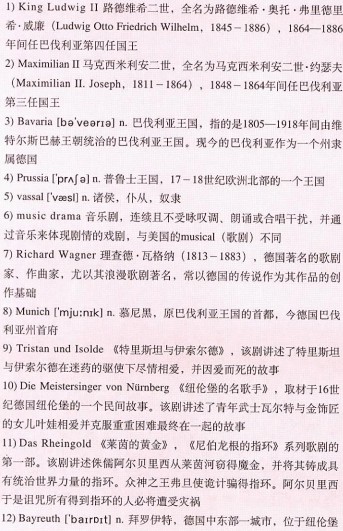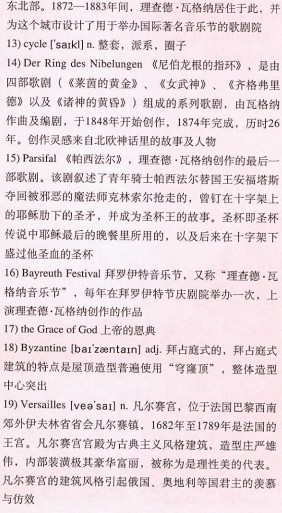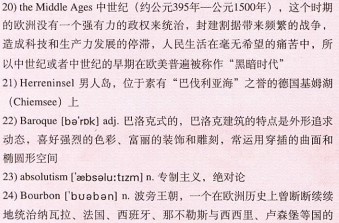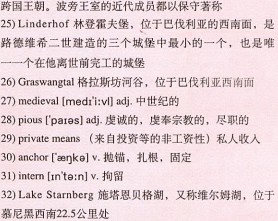文字难度:★★★☆
他一生孤寂,其间不是面对政治密谋就是人身攻击。在那个君权当道的年代,在一场败仗之后,他不满于自己徒有的名衔,试图改变而又不得其所,因而常与内阁中的长老意见相悖。他与著名作曲家理查德·瓦格纳的交往因过度挥霍,以及公私不分而遭内阁人士与人民的强烈反对。理查德·瓦格纳最终被迫离开慕尼黑,这使他愈加厌恶慕尼黑,而倾心于巴伐利亚山区——一个让他感到快乐与自在的世界。
1869年,就在巴伐利亚南部的天鹅堡遗址上方,他勾勒出自己的梦的世界——新天鹅堡。因为在新天鹅堡完工前离奇死亡,那便成了他的一个未完成的梦。而今德国人把他的梦变成了现实,耗费巨资建成的新天鹅堡成为了德国最热门的旅游景点之一。
他,就是巴伐利亚国王路德维希二世。
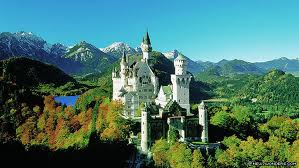 Even before he died, 1)King Ludwig II had already become something of a legend. His palaces, which were barred to strangers, have been visited by over 50 million people since his death. They are records in stone of the ideal fantasy world which the king built as a refuge from reality. His historic, poetic and ideal interpretation of his role as king was finally his downfall.
Even before he died, 1)King Ludwig II had already become something of a legend. His palaces, which were barred to strangers, have been visited by over 50 million people since his death. They are records in stone of the ideal fantasy world which the king built as a refuge from reality. His historic, poetic and ideal interpretation of his role as king was finally his downfall.
即使是在巴伐利亚国王路德维希二世去世之前,他就已经成为一个传奇人物了。自他去世以来,已经有超过五千万的人参观过他那些曾禁止陌生人进入的宫殿。这些宫殿是路德维希二世建来逃离现实的避难所,以石块的形式记录了他的梦幻世界。他对于自己作为国王身份的理解具有历史性、诗意且理想化,这最终导致了他的垮台。
Ludwig and his brother Otto were strictly brought up with an emphasis on duty. Their parents 2)Maximilian II of 3)Bavaria and Marie of 4)Prussia kept themselves at a distance. “Ludwig enjoyed dressing up ... took pleasure in play acting, loved pictures and the like... and liked ... making presents of his property, money and other possessions,” said his mother.
路德维希和他的弟弟奥托在成长的过程中,被严格要求要有责任感。他们的父母——巴伐利亚国王马克西米利安二世和普鲁士王国的公主玛丽只是远远地看着他们。“路德维希喜欢打扮……喜欢表演,喜欢图画之类的东西……喜欢……拿自己的财产,如钱和其他东西来送礼。”他母亲说道。
In 1864 Ludwig acceded to the throne at the age of 18 without any experience of life or politics. In 1866 Ludwig II suffered the biggest defeat of his life: in 1866, the expanding state of Prussia conquered Austria and Bavaria in the war. From then on, Bavaria’s foreign policy was dictated by Prussia and the king was only a “5)vassal” of his Prussian uncle.
1864年,18岁的路德维希在毫无生活阅历和执政经验的情况下继承了王位。1866年,路德维希二世遭遇了生平最大的败仗:1866年,扩张中的普鲁士在战争中打败了奥地利和巴伐利亚。从那时起,巴伐利亚的外交政策就听命于普鲁士,而巴伐利亚国王路德维希二世只不过是他那个普鲁士舅舅的仆从而已。
As a child, Prince Ludwig was already fascinated by the 6)music dramas and writings of 7)Richard Wagner. He wanted to bring the composer to 8)Munich as soon as he became king, and realize his dream of an opera festival. In 1864 he summoned Wagner to him. In the following years, Munich became the music capital of Europe with the premieres of 9)Tristan und Isolde, 10)Die Meistersinger von Nürnberg, and 11)Das Rheingold.
还是个孩子的时候,路德维希王子就已经很痴迷于音乐剧和理查德·瓦格纳的作品。他希望自己一即位就召这位作曲家到慕尼黑来,实现他的梦想——创办一个歌剧节。1864年,他召见了瓦格纳。在接下来的几年时间里,慕尼黑借助歌剧《特里斯坦与伊索尔德》、《纽伦堡的名歌手》和《莱茵的黄金》的首演,成为了欧洲的音乐之都。
Wagner was however forced to leave Munich by the end of 1865 because of conflict with the government. Nevertheless, Ludwig II continued with his lavish support for Wagner’s work. The monumental festival theatre planned for Munich was built in 12)Bayreuth and inaugurated in 1876 with the 13)cycle 14)Der Ring des Nibelungen. In 1882 15)Parsifal was premiered here. Without Ludwig II’s commitment, there would never have been a 16)Bayreuth Festival.
然而,由于和政府的龃龉,1865年年末,瓦格纳被迫离开了慕尼黑。尽管如此,路德维希二世继续慷慨地支持瓦格纳的创作。1876年,原为慕尼黑筹建的有重大意义的节庆剧院在拜罗伊特建成,开幕典礼上演出了瓦格纳的《尼伯龙根的指环》系列歌剧。1882年,瓦格纳创作的歌剧《帕西法尔》在此首演。没有路德维希二世的贡献,世界上根本不会有“拜罗伊特音乐节”。
Ludwig II was possessed by the idea of a holy kingdom by 17)the Grace of God. In reality he was a constitutional monarch, a head of state with rights and duties and little freedom of action. For this reason he built a fantasy world around him in which—far removed from reality—he could feel he was a real king. From 1875 on he lived at night and slept during the day.
路德维希二世痴迷于神赐王权的思想,但是在现实中,他身为立宪制的君主,是拥有权利和义务却少有行动自由的象征性的国家元首。因为这个原因,他在自己周围建立了一个梦幻世界,远离现实,在那里他才能感觉到自己是一个真正的国王。从1875年开始,他昼伏夜出地生活。
Idealized designs by scene painters for a “New Hohenschwangau Castle” high above the tranquil Hohenschwangau of Ludwig II’s father, a “18)By-zantine Palace” and a copy of 19)Versailles were already in existence by 1868. From the beginning, Ludwig II’s fantasy world embraced several different epochs. The “New Castle”, was based on Christian kingship in 20)the Middle Ages, and the new Versailles, built from 1878 on the 21)Herre-ninsel, recalls the 22)baroque 23)absolutism of the 24)Bourbon King of France. 25)Linderhof in the 26)Graswangtal, built from 1869, imitates a va-riety of styles, with the help of the latest techno-logy. The latest technology was also used for the highly elaborate coaches and sleighs in which the king travelled at night, sometimes in historic costume. Ludwig II spent more and more time in the mountains and correspondingly less time in Munich. His fantasy world was further maintained by “private performances” in the Munich Hoftheater: operas performed for the king alone. 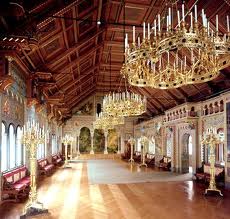 布景画师为一座位于路德维希二世的父亲所建的宁静的天鹅堡上方的 “新天鹅堡”、一座“拜占庭式的宫殿”,以及一处凡尔赛宫的复制建筑所作的理想化设计,在1868年就已经存在了。从一开始,路德维希二世的梦幻世界就包含了几种不同时期的建筑风格。“新城堡”的建筑风格基于中世纪基督教统治时期的建筑风格,1878年起在男人岛建的新凡尔赛宫(即海伦基姆宫)是对法国波旁王朝巴洛克式专制主义的追慕。位于格拉斯坊河谷的林登霍夫堡自1869年始建,借助最新的工艺模仿了各类建筑风格。最新的技术同时也应用于制作非常精致的四轮大马车,以及供时而穿着历史剧服装的国王在夜间出行时用的雪橇。路德维希二世把越来越多的时间花在了山里,相对地就越来越少呆在慕尼黑。他的梦幻世界,通过他在慕尼黑霍夫剧院私下独自观赏的歌剧表演得到了进一步的维持。
布景画师为一座位于路德维希二世的父亲所建的宁静的天鹅堡上方的 “新天鹅堡”、一座“拜占庭式的宫殿”,以及一处凡尔赛宫的复制建筑所作的理想化设计,在1868年就已经存在了。从一开始,路德维希二世的梦幻世界就包含了几种不同时期的建筑风格。“新城堡”的建筑风格基于中世纪基督教统治时期的建筑风格,1878年起在男人岛建的新凡尔赛宫(即海伦基姆宫)是对法国波旁王朝巴洛克式专制主义的追慕。位于格拉斯坊河谷的林登霍夫堡自1869年始建,借助最新的工艺模仿了各类建筑风格。最新的技术同时也应用于制作非常精致的四轮大马车,以及供时而穿着历史剧服装的国王在夜间出行时用的雪橇。路德维希二世把越来越多的时间花在了山里,相对地就越来越少呆在慕尼黑。他的梦幻世界,通过他在慕尼黑霍夫剧院私下独自观赏的歌剧表演得到了进一步的维持。
Ludwig II increasingly identified himself with Parsifal, the legendary 27)medieval figure who became Grail King through his purity and faith and thereby redeemed his sin-laden uncle. The inner battle for freedom from sin and purity is distressingly evident in the diaries of the extremely 28)pious king. This particular legend is the subject of Richard Wagner’s last work Parsifal, which he began in 1877. Wagner and his circle privately referred to the king as “Parsifal”, and his problems were incorporated into the drama of the Grail.
路德维希二世日益把自己当成是帕西法尔,从而为他那个罪恶累累的舅舅赎罪。帕西法尔是传说中生活于中世纪的人物,他依靠自己内心的纯净和信仰成为了圣杯王。路德维希二世这个对神极其虔诚的国王显然在他的日记里,以一种悲痛的方式展现了内心的战斗——为了从内心罪恶和纯净的斗争中获得自由的战斗。这个独特的传说就是理查德·瓦格纳于1877年开始创作的生平最后一部作品《帕西法尔》的主题。瓦格纳和他的团队私下把路德维希二世称为“帕西法尔”,并把路德维希二世面临的问题写进了这部有关圣杯的歌剧中。
The “ideal monarchical poetic solitude” which the king chose for himself was not in the long run compatible with his duties as a head of state. The new settings he was constantly devising for himself were equally beyond the 29)private means of a king. Ludwig II failed through his desire to 30)anchor his illusions and dreams in reality.
路德维希二世选择的“理想而诗意的帝王孤独”不能长久地与他作为一国元首的职责相容。他不断为自己设想出的新建筑所需的经费同样超出了一个国王私欲的限度。路德维希二世渴望在现实中实现他的幻梦,但失败了。
From 1885 on foreign banks threatened to seize his property. The king’s refusal to react rationally led the government to declare him insane and depose him in 1886. Ludwig II was 31)interned in Berg Palace. The next day he died in mysterious circumstances in 32)Lake Starnberg, together with the psychiatrist who had certified him as insane.
从1885年开始,外国银行威胁说要冻结他的财产。路德维希二世不理智的反抗导致政府宣布他患有精神病,并于1886年罢黜了他。路德维希二世被带到伯格宫里拘禁起来。一天后,他和那个鉴定他神智失常的精神病医师一起神秘地死在了施塔恩贝格湖里。
